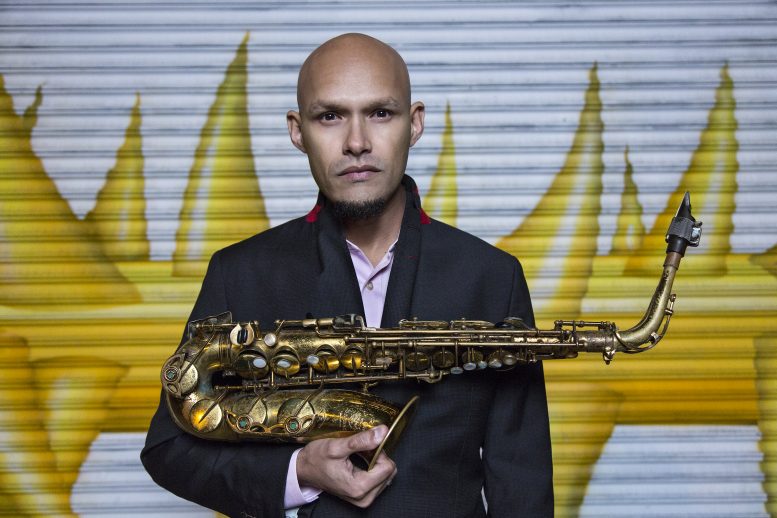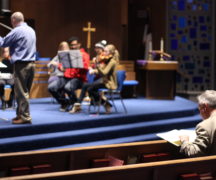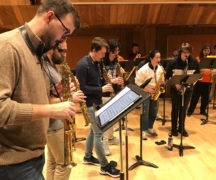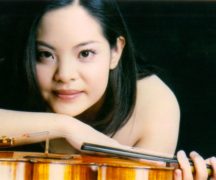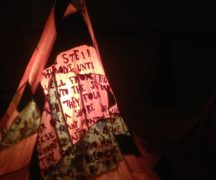By DAVID DUPONT
BG Independent News
Miguel Zenon’s music is rooted in the twin heritages of jazz and the music of Puerto Rico.
The composer and saxophonist’s potent blending of those traditions has earned him a MacArthur Fellowship, the so-called “genius grant.” MacArthur Fellows website says that Zenon is: “Drawing from a variety of jazz idioms and the indigenous music of his native Puerto Rico to create a new language of complex, yet accessible sounds that overflow with emotion.”
Zenon will visit the Bowling Green State University campus Wednesday, Jan. 24, and Thursday, Jan.25, to perform and work with students. On Thursday at 8 p.m. in Kobacker Hall, the Jazz Lab I, directed by David Bixler, will perform Zenon’s music with the composer as soloist. He will also sit in with the jazz faculty during their regular session downtown at Bar 149 Wednesday at 8:30 p.m.
In teaching, Zenon said in a recent telephone interview, “I just try to give an idea of the things that worked for me. I feel what really works is looking back and trying to learn from that process.”
He urges students “to trace it back to what happened before to try to discover themselves through that.”
Zenon’s journey of discovery began in Puerto Rico. He didn’t come from a family of musicians, but was surrounded by music. There was the pop music his peers loved, and the music his mother played on the radio. And his father was an amateur percussionist. Zenon had the usual early elementary education, singing in choir and tooting recorder.
“I was exposed a lot of folklore because it’s embedded in the culture,” Zenon, 41, said. He heard folk sounds at parties and holiday celebrations. “I was exposed to certain rhythmic things.”
At 11 he was admitted to a performing arts school. He was asked to select an instrument. He wanted piano, but the school had enough pianists. Of the available options, he picked saxophone. “I just wanted to play music more than any specific instrument,” Zenon said.
His musical studies were strictly in classical music. His first music jobs were playing in salsa bands. At this point, he wasn’t considering a career in music. He loved math and natural science, and was headed in that direction.
Then some friends played him the music of jazz masters Charlie “Bird” Parker, Miles Davis, and John Coltrane. That flipped his outlook.
The young saxophonist was drawn to the element of improvisation. The musicians played spontaneously in “a very developed language that was very intellectual and very heartfelt.”
“When I heard them use this language, I wanted to dig in deeper,” he said.
His desire to find his own path through jazz led him into higher education. He moved to Boston to study at Berklee College of Music, and then after graduating continued his studies at Manhattan College of Music and earned a master’s degree.
Zenon started thinking about “what I wanted my music to be like, what my whole persona in music to be like.”
So he started studying the music of Puerto Rico “with the same purpose I had with jazz.” He studied its language and history. Even as he revisited this familiar ground, Zenon came to see he had misunderstood certain elements.
More and more that music mixed with jazz. “It just felt really natural.”
In New York, he played in the Afro Latin Jazz Orchestra where he sat in the saxophone section with Bixler. They discussed the possibility of Zenon visiting campus for a residency.
“The idea of sharing information with young musicians and teaching is becoming a very integral part of what we do as jazz musicians,” Zenon said.
He enjoys the interaction with students, and the chance to perform his music with them. There’s a certain back and forth, he said, in choosing music that fits the situation.
While the Latin rhythms may be new to these musicians, Zenon doesn’t see it as insurmountable. A musician doesn’t have to be Puerto Rican, or even familiar with those sounds, to “find your place in the music.”
“I really see it as jazz music somewhat informed Puerto Rico and Latin music. In essence it’s just jazz music, and if you’re familiar with that music, you’ll be able to deal with it.”

